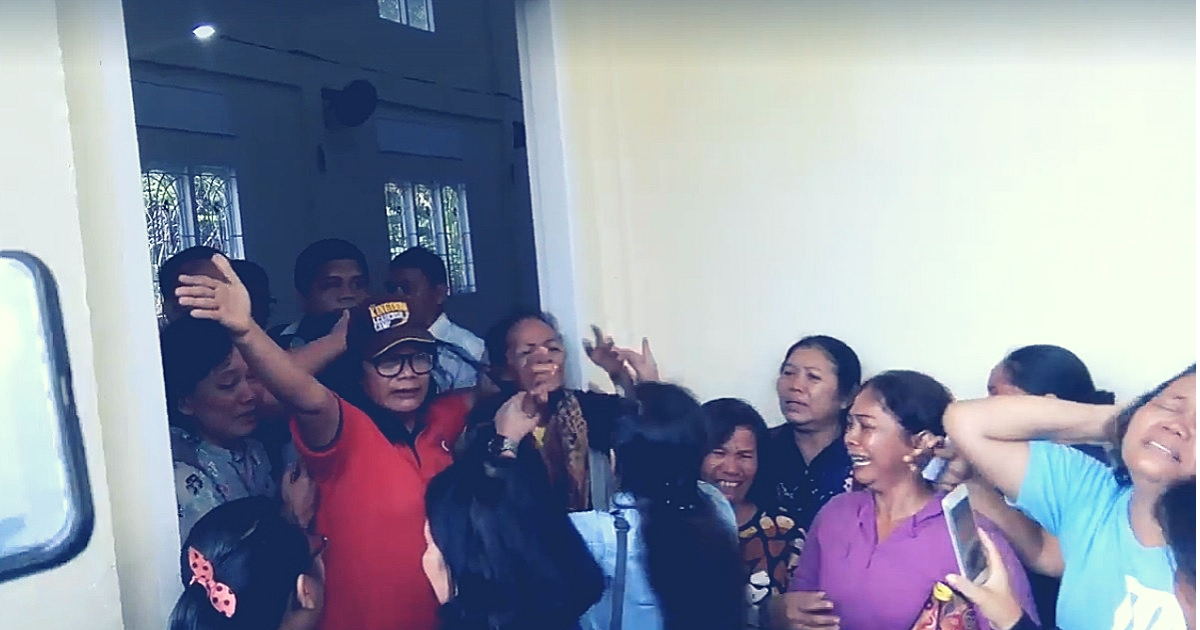Last Thursday, three churches in East Sumatra’s Jambi City were sealed shut by the city’s government due to the threat of protest by intolerant groups. Videos of the churches’ congregations crying hysterically as police shut the doors on their houses of worship went viral and have led many to accuse the government, both local and national, of failing to stand up for the rights of religious minorities.
https://www.facebook.com/choky.nainggolan/posts/2142394052447723
Amnesty International Indonesia, the local branch of the international rights activist NGO, said that the closing of the three churches was a serious violation of the right to worship guaranteed in Indonesia’s constitution as well as international human rights accords.
“The discrimination and human rights violations must be stopped immediately and the Jambi City Government must immediately unseal the three churches or provide places of worship to ensure that hundreds of congregation members can worship. This incident violates Indonesia’s international human rights obligations,” Amnesty International Indonesia director Usman Hamid said in statement released on Monday and picked up by Tribun.
Usman’s statement argued that the Jambi City government’s official justification for closing the churches, which is that the decades-old churches had been operating without official building permits, did not excuse the blatant disregard for the rights of those who worshiped at the church.
The Amnesty Indonesia director also argued that incidents such as what was happening in Jambi continued to take place because the central government was unwilling to take action against regional governments that discriminated against religious minorities.
“This incident in Jambi once again tarnishes the image of Joko Widodo and Jusuf Kalla’s administration, as they had both promised to protect minority groups in Indonesia during the 2014 presidential election campaign,” Usman said. “If the Jokowi government does not correct this by ordering the sealing of the churches reversed, it shows that Jokowi has forgotten his promises to protect minorities in Indonesia.”.
The three churches that were sealed by the government Thursday morning were Gereja Sidang Jemaat Allah, Gereja Huria Kristen Indonesia Simpang Rimbo and Gereja Methodist Indonesia Kanaan Jambi.
One of the administrators of Gereja Methodist, Oberlin Tampubolon, told KBR that they had not received any prior warning that their house of worship would be closed but suspected it was due to pressure from various groups that had threatened to hold a demonstration that day if the churches were not shuttered.
“Nobody tried to resist, but the women of my congregation shed tears. They said: this is not a place of sin, this is where we worship,” Oberlin told KBR on Thursday night.
According to him, the Methodist church was built about 20 years ago and had been in use all of that time and had never had any problems with the local community until now.
Reports suggest that the problems began in July when a letter from various community leaders and citizens living around the churches in Jambi City’s Kenali Besar Village wrote a letter of protest to the government demanding that the churches in question be sealed immediately because they were disturbing the community and because they did not have proper building permits (IMB).
In that, the complainants were apparently correct. None of the three churches had proper IMBs from the government, despite having been in use for decades.
But that’s not for a lack of trying. Sinaga, another member of the church, told Tribun that they had tried to apply for an official permit many times but the local government had always denied them.
“They refused but we do not know what the reason was. Even though this is a place of worship. We have never disturbed people from other religions here. We are here to help each other, to love and share with each other,” Sinaga said.
Liphan Pasaribu, the head of the National and Political Unity Agency (Kesbangpol) of Jambi told the media that the sealing was done as the result of a joint decision made on Wednesday by various government agencies and the police, as well as groups local including local chapter of the Indonesian Ulema Council (MUI) and local Religious Harmony Forum (FKUB). No representatives of the churches in question were present.
If you’re not familiar with FKUB, the ironically named bodies were created as the result of a 2006 regulation that requires one to be in every local administration of Indonesia with the primary purpose of approving the construction of houses of worship. However, because the membership of each FKUB is “proportional” to the religious makeup of the population in each area, they essentially give the religious majority veto power over the the construction of houses of worship for religious minorities. Human rights activists argue that these “harmony” forums are one of the major reasons for Indonesia’s growing religious intolerance.
And indeed that seems to be the case here, as Jambi FKUB chairman Husin Abdul Wahab justified their decision to close the churches on the grounds that it could create chaos in the community if they didn’t bow down to the complainants demands.
“Later the consequences could be something undesirable. If [the churches] were not closed as soon as possible, the community would close them themselves. If the community closed them, it would cause a commotion. The news could spread to other countries,” Husin told KBR.
The Jambi City government tried to come up with a solution by allowing the congregations to conduct their services in government facilities, including the city’s tennis courts. But the congregations refused and instead chose to worship in the areas outside of their respective churches on Sunday. Police provided security for the congregations and their services were carried out peacefully.
Liphan said today that the government was still working on coming up with a solution and said that for now the congregations were still welcome to worship at the government provided facilities or outside of their churches (with government provided security), but he did not suggest that unsealing the churches would be an option any time soon.





Reader Interactions